Work-based learning as a pathway to competence-based education
International researchers meet at BIBB to discuss research and implementation strategies
The Federal Institute for Vocational Education and Training (BIBB) and UNESCO-UNEVOC invited scholars from the UNEVOC network and beyond to gather in Bonn for a two-day international workshop titled “Work-based learning as a pathway to competence-based education – Research and implementation strategies from a comparative and global VET perspective”.
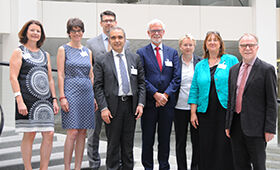
It was the purpose of the workshop to tie together different perspectives, experiences and approaches while looking at research initiatives from different regions in the world. Furthermore, the resulting exchange of ideas, creation of knowledge and discussion of useful research approaches was meant to support endeavours by members of the UNEVOC network to meet their individual TVET objectives.
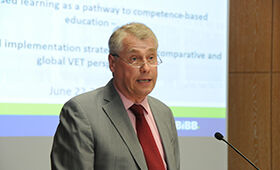
In his opening remarks, BIBB President Friedrich Hubert Esser stressed that work-based learning (WBL) is a core component in German VET research and an important aspect of the daily work conducted at BIBB. He emphasized that there is “the potential to use WBL as a vehicle for lending sustainable emphasis to the role of present and future research.” Experiences with WBL as one element of the vocational education and training system show that it is successful in terms of enhancing economic performances of companies and of the individual. WBL “is perceived as offering a major opportunity in terms of resolving structural problems and strengthening economic and social development in many countries.”
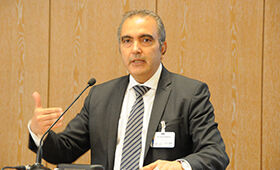
Borhène Chakroun, Chief of the Youth, Literacy and Skills Development Section from UNESCO Paris emphasized the importance of the topic for the UNESCO-UNEVOC network. He acknowledged that there is an economic, a social equality, and a sustainability dimension to WBL. Citing Germany as an example, Chakroun stressed that “work-based learning contributes to economic growth and combats youth unemployment.”
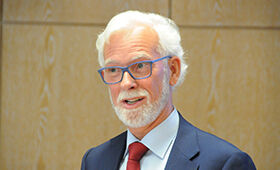
Martin Mulder, holding his keynote speech on the topic of “The global need for competence - Competence-based VET and implications for policy and practice”, gave an overview of research conducted in the field of competence development and stressed that over the last five decades, the topic of competence-based education (CBE) became increasingly important, especially in politics. Mulder distinguished three types of competencies: competencies for specific tasks, competencies for known jobs and competencies for an unknown future. Pointing out that vocational education and training plays an essential role in developing professional competence that includes the dissemination of knowledge, skills and professional attitudes. It is the task of those involved in VET to include all three types of competencies in the VET system.
Furthermore, Moulder emphasised that many mistakes have been made with the design, development and implementation of CBE, and it seems that these mistakes are being repeated over and over again. What has gone wrong, and what lessons can be taken away from this for the governance of current VET, for the organization of VET, working conditions and career management of VET teaching staff, teaching and teacher professional development in VET, and VET quality assurance were other key issues he raised during his presentation.

In his keynote speech “Securing occupational capacities through workplace experiences”, Stephen Billett stressed that across human history, the vast majority of occupational capacities have been secured through experiences in workplaces and by quite distinct means from those within educational institutions. Through participation in occupational practice, learning occurs all the time. Participants either encounter new experiences (“novel learning”) or repeated experiences that reinforce or refine what they already know. The workplace provides access to authentic and purposive activities, contextualised experiences, and guidance by more experienced co-workers and is as such a good environment for collecting experiences. Billett argued for curriculum pedagogy and personal epistemology practices as being central to understanding learning through practice and suggested to focus on “learning, interdependence and experiencing, rather than teaching, independence or experiences.”
During the workshop, researchers from all over the world discussed the following topics in five different paper session:
- Paper session I: „Identification of conducive factors for learning on the level of the Individual subject and the work environment“
- Paper session II: „The role and nature of guidance and counselling available from tutors, fellow workers and instructors in WBL“
- Paper session III: „Curriculum development for WBL-schemes in schools, companies and institutions of higher education“
- Paper session IV: “Boundary crossing: Options for the transfer of knowledge, skills and competences between contexts”
- Paper Session V: „Challenges of formalizing the informal“
The results of the workshop and the papers will be published in a joint publication of BIBB and UNESCO-UNEVOC.
Objective of the workshop
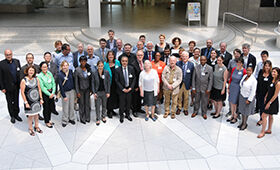
The workshop provided a global perspective on work-based learning as a pathway for competency-based education and how this relates to empirical research. The workshop linked scholarly experts and institutions in the area of TVET across the world to share ideas about how research can be designed and conducted to improve work-based learning and take better advantage of its potential benefits both for individuals and employers/sectors.
It also seeks to develop a research perspective that can be fruitful both for academic and educational purposes in the framework of the UNESCO TVET strategy (2016-2021).
Background
The promotion of work-based learning as a key element in any TVET strategy is high on the political agenda these days. The success and wide use of the term, though, is presumably also partly related to its vagueness. Its meaning ranges from “experiential” or “informal learning” in the workplace itself, “learning-on-the-job” and “work-related learning” in explicitly vocational contexts and TVET institutions. WBL seems to be a panacea for all kinds of educational and economic challenges. Some voices highlight its potential for an increased economic competitiveness of employers, sectors and whole nations, others for a smooth transition of youths from school to labour and a cure for youth unemployment, and still others stress its role as a significant parameter in individuals’ career development. The research on the evidence and practice of work-based learning is rather diverse, too. Existing studies and reports vary widely with regard to their research question, empirical scope and the methods applied.
The thematic frame of the workshop is based on an extensive literature review of the current state of research in WBL in connection to TVET on a global scale. National as well as international studies have been identified and mapped in order to get a picture of the notion and scope of work-based learning, strengths and weaknesses of TVET research in this field, as well as its geographical distribution. The results of the study show a high diversity of notions, practices and existing approaches, nevertheless rely on a number of salient common aspects.
Both UNESCO-UNEVOC and BIBB as one of the UNEVOC Centres in Germany offer a platform for the promotion of further networking and collaborative work between TVET institutions and research partners worldwide. The UNEVOC Network is instrumental in the production and dissemination of research, case studies, databases, publications, and enables the UNESCO-UNEVOC International Centre to perform its function as a clearinghouse. The BIBB is recognized as a centre of excellence for vocational research in Germany and hosts the German Office for International Cooperation in Vocational Education and Training (GOVET). GOVET advises potential cooperation partners from home and abroad how to find suitable partners and funding instruments within the field of vocational education and training cooperation.